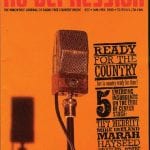Hoyt Axton: 1938 to 1999
I will separate and sail
on a sea that’s all my own,
but I promise I will write
when I am able.
The words came so easy, and sing still: “Jeremiah was a bullfrog/Was a good friend of mine.” I found the notes on the piano, and learned the words by heart. Sixth grade, 1969, and Mrs. Hester had us memorizing Kipling. “I never understood a single word he said/But I helped him drink his wine.” Made better sense than “You’ll be a man, my son.”
It is not possible to convey the horror of my singing on paper, but perhaps this will help: Only ten percent of the sixth grade class at Brookside Elementary failed the audition for chorus. I was on stage crew. Consequently I know the lyrics to two popular songs only: “Joy To The World” and the Janis Joplin/Bob Neuwirth classic “Mercedes Benz”.
Some years later I figured out that Hoyt Axton had written “Joy To The World”, as well as my other favorite Three Dog Night hit, “Never Been To Spain”. And also the Kingston Trio’s “Greenback Dollar” (co-written with Ken Ramsey), Steppenwolf’s “The Pusher” and Ringo Starr’s “The No No Song”, early adolescent favorites all.
But really I discovered Axton through my older brother’s brief flirtation with country music toward the end of the outlaw ’70s. Axton slipped in alongside Waylon & Willie and a terrific Mary Kay Place album, but it was Hoyt’s words and music that stuck.
His songs were often rhapsodies and, like Roger Miller’s best non sequiturs, full of droll wordplay. “Riva could rock/Riva could roll/Riva could carry me down to the sea.” And his voice had the inescapable warmth of Don Williams, seasoned with what one guessed to be prudent portions of smoke and whiskey.
It was the voice of a friend who laughed often, though of course we never met.
He played the Seattle Center Arena when I was in college, and though I was deeply entranced by the local punk scene of the late ’70s, and though tickets were mighty pricey for a student, I went, dragging my high school debate partner along. Good seats were still available, and it wasn’t a great show. No matter. We spent much of the night arguing over whether Jonathan Richman or John Cale had cut the definitive punk version of “Heartbreak Hotel”, the song Axton’s mom was best-known for co-writing.
My last year in college, a decade before grunge was dreamt of, I wrote a long short story based on a half-heard story about a Seattle country singer who had died of a drug overdose and been buried in the woods by his friends. I imagined them singing the epigraph at the top of this story over his grave. When I moved to Nashville two decades later, now somehow writing about country music of all things, I discovered that one of my new friends was the deceased singer’s niece.
I do not know what the song is called, nor even on what album it is to be found. In fact, I have quoted all the lyrics here from memory, and some of the words are bound to be wrong. The cassette I once had vanished years ago, but Hoyt Axton’s songs and voice remain.
He died October 26, 1999, at his ranch in Victor, Montana.




